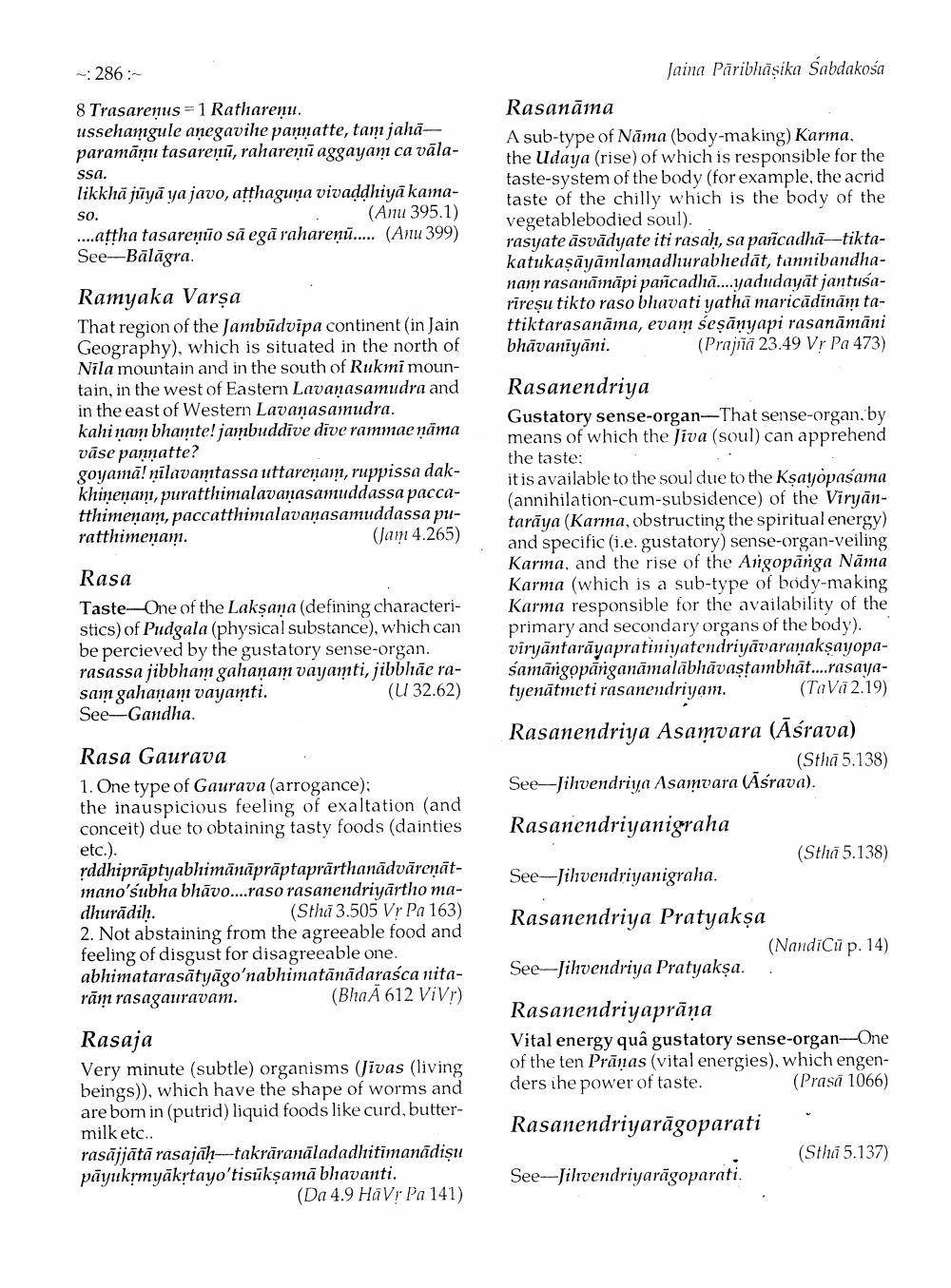________________
- 286:
Jaina Pāribhāsika Sabdakosa
8 Trasarenus = 1 Rathareņu. ussehamgule anegavihe pannatte, tam jahaparamāņu tasareņā, rahareņi aggayam ca vālassa. likkhā jūya ya javo, atthaguna vivaddhiyā kamaSo.
(Anu 395.1) ....attha tasaremo sā egā rahareņū..... (Anu 399) See-Bālāgra.
Rasanāma A sub-type of Nāma (body-making) Karma, the Udaya (rise) of which is responsible for the taste-system of the body (for example, the acrid taste of the chilly which is the body of the vegetablebodied soul). rasyate āsvādyate iti rasah, sa pañcadhā tiktakatukasāyāmlamadhurabhedāt, tannibandhanam rasanāmāpi pañcadhā....ijadudayāt jantusarīresu tikto raso bhavati yathā maricādinām tattiktarasanāma, evam seşānyapi rasanāmāni bhāvanīyāni. (Prajñā 23.49 V? Pa 473)
Ramyaka Varşa That region of the Jambūdvipa continent (in Jain Geography), which is situated in the north of Nila mountain and in the south of Rukmi mountain, in the west of Eastern Lavanasamudra and in the east of Western Lavanasamudra. kahi nam bhamte! jambuddive dive rammae nama vāse pannatte? goyama! milavamtassa uttareņam, ruppissa dakkhinenam, puratthimalavanasamuddassa paccatthimeņam, paccatthimalavaṇasamuddassa puratthimenam.
(Jam 4.265)
Rasanendriya Gustatory sense-organ-That sense-organ, by means of which the Jiva (soul) can apprehend the taste: it is available to the soul due to the Kşaljopasama (annihilation-cum-subsidence) of the Viryāntarāya (Karma, obstructing the spiritual energy) and specific (i.e. gustatory) sense-organ-veiling Karma, and the rise of the Argopānga Nama Karma (which is a sub-type of body-making Karma responsible for the availability of the primary and secondary organs of the body). viryāntarāyapratiniyatendriyāvaranakşayopasamāngopănganāmalābhāvastambhät....rasayatyenātmeti rasanendriyam. (ToVa 2.19)
Rasa Taste-One of the Laksana (defining characteristics) of Pudgala (physical substance), which can be percieved by the gustatory sense-organ. rasassa jibbham gahanam vayamti, jibbhāe rasam gahananı vayamti.
(U 32.62) See-Gandha.
Rasanendriya Asamvara (Aśrava)
(Sthā5.138) See—Jihvendriya Asamvara (Aśrava).
Rasanendriyanigraha
(Stha 5.138)
Rasa Gaurava 1. One type of Gaurava (arrogance); the inauspicious feeling of exaltation (and conceit) due to obtaining tasty foods (dainties etc.). rddhiprāptyabhimānāprāptaprarthanädvāreņātmano'subha bhāvo....raso rasanendriyārtho madhurādih.
(Sthi 3.505 Vr Pa 163) 2. Not abstaining from the agreeable food and feeling of disgust for disagreeable one. abhimatarasātyāgo'nabhimatänādarasca nitarām rasagauravam.
(BhaĀ 612 ViVr)
See-Jilvendriyanigraha.
Rasanendriya Pratyakşa
(NandiCū p. 14) See--Jihvendriya Pratyakşa.
Rasanendriyaprāņa Vital energy quâ gustatory sense-organ-One of the ten Prānas (vital energies), which engenders ihe power of taste.
(Prasă 1066)
Rasaja Very minute (subtle) organisms (Jivas (living beings)), which have the shape of worms and are born in (putrid) liquid foods like curd, buttermilk etc.. rasājjätä rasajāh-takrāranāladadhitimanādişu pāyukrmyākrtayo'tisūkşamā bhavanti.
(Da 4.9 HaVi Pa 141)
Rasanendriyarāgoparati
(Sthi 5.137)
See--Jilivendriyarāgoparati.




